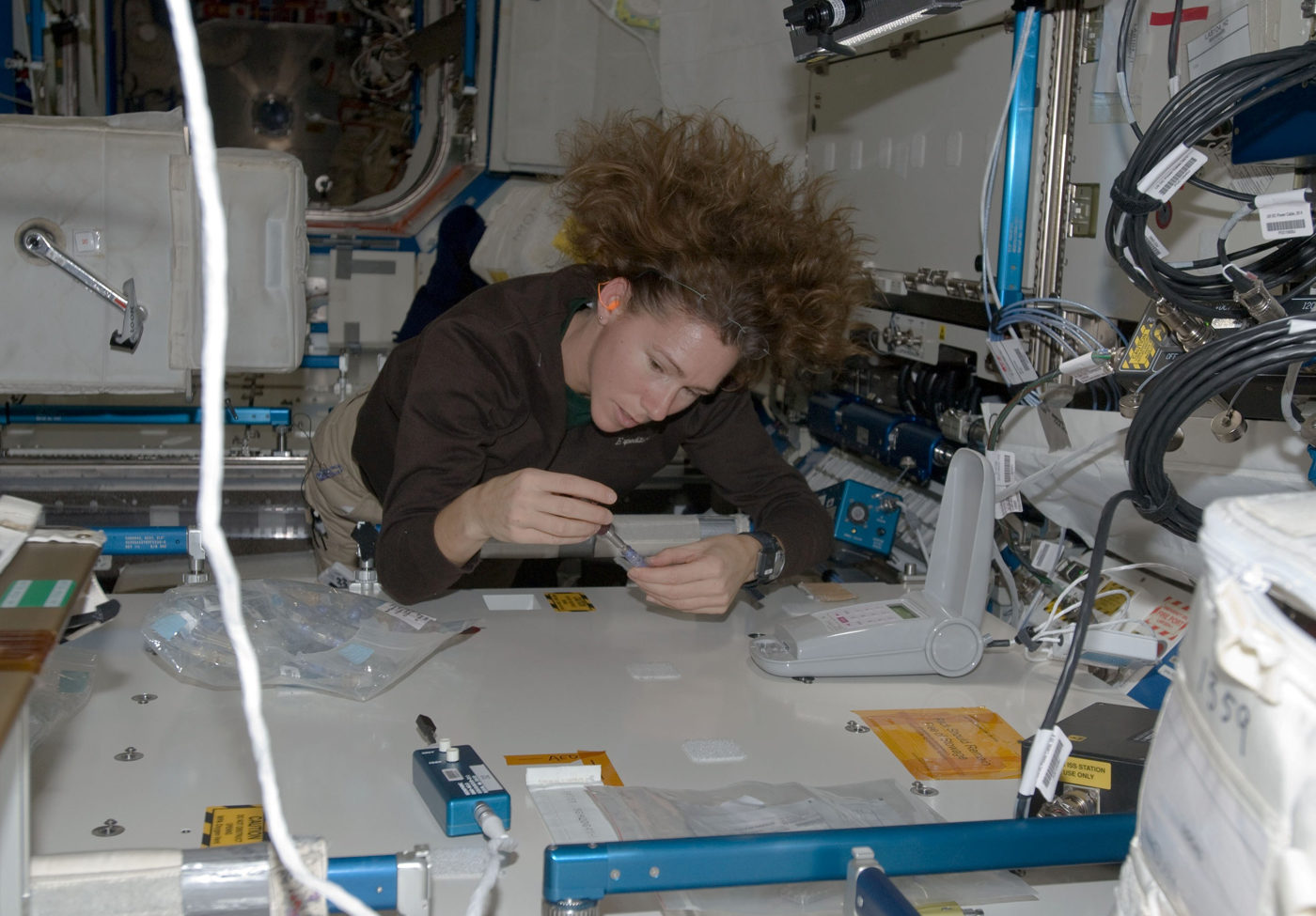April 22, 2018 8:00 pm
The Brain after Blastoff: How Spaceflight May Impact the Nervous System
Today’s guest blog post is by StarTalk intern Jenna Tipaldo. Studying Psychology, Human Biology, and Media Studies at the Macaulay Honors College at Hunter College, Jenna is an advocate for STEAM, science education, and representation of diversity. Find her on Twitter @jennatip or on her website.

Sandra Magnus, Expedition 18. Credit: NASA.
From the many people who have been to space during our first few decades of exploration (over 500 of them, not including a dummy astronaut in a Tesla), we already know that the brain and body can function in microgravity. There are already documented effects of how the body can change while in space – take it from StarTalk All-Star host, astronaut Mike Massimino, and his guest, astronaut Sandra Magnus, in The Future of Human Spaceflight, with Mike Massimino. More research, however, should be done in order to fully understand the short- and long-term effects on the nervous system specifically. According to the existing body of research on the effects of gravitational changes experienced during spaceflight, your physiology and even cognitive performance may be impacted by a trip to space.
Your skull does a pretty good job of doing what it has evolved for hundreds of millions of years to do – protecting that vital yet delicate brain – but, assuming that you’re reading this from Earth, that is most true here. In space, the skull can maintain its rigid shape but there is still an absence of gravity that influences the flesh and fluids of the brain. In Spaceballs, Lord Dark Helmet (parody of the infamous Darth Vader) exclaims, “My brains are going into my feet!” because of the extreme g-force when the ship accelerates to “ludicrous speed.”
In a sense, the opposite is true in microgravity. Because there is no longer a downward gravitational force pulling on your body, the fluid within it balances out, resulting in more pressure in regions such as the brain. The body adjusts by excreting fluids to lower the higher-than-normal pressure in the upper body, according to NASA and their considerable experience in dealing with astronaut bodies and bodily fluids. NASA is also concerned with bone loss in astronauts due to long-term stays in a micro-g environment. Regarding the spinal cord, researchers have found significant atrophy of spinal muscles in astronauts, and additionally that astronauts tend to experience significantly more herniated intervertebral disks than a control group on Earth. Yet, exactly how and why these changes occur pathophysiologically is not yet fully understood; we need to look further into how to effectively address these bodily changes.
In addition to physiological changes, spaceflight may induce functional and cognitive changes in astronauts, with neuroplasticity playing an adaptive role. Studying the effects of microgravity on the body is important, but spaceflight may involve experiencing many different gravitational strengths from takeoff to landing, potentially on the Moon, Mars, or beyond. Recently, Japanese researchers conducted experiments on a parabolic flight to test cognitive abilities, performing tests before the flight, in 2g on the way up, in microgravity, in 1/6g (approximately that of the Moon) on the way down, and after the flight. This data, once analyzed, will be useful in gaging cognitive potential in various environments where people could live at some point in the future, such as in space or on planets with a different gravitational field strength than that of Earth.
Changes in gravity may impact the brain and body, but so may the stress of the job itself. Missions to space may be uniquely stressful due to the challenges of being productive under pressure, as well as facing new situations and risk every day. John Charles, Chief Scientist at NASA’s Human Research Program, explains in the Extended Classic: Putting Humans on Mars, with Mike Massimino that one of NASA’s research goals is to figure out how to help astronauts be able to “work as hard as they’ve ever worked in their entire lives.” To do this, they are looking at both the psychology and the physiology of how people deal with stress and adjust to the various challenges of space travel.
Understanding how the brain and body function under stress may be useful to more than astronauts. As you probably already know, you don’t have to leave Earth’s atmosphere to experience stress, so even those of us who may never set foot in space stand to benefit from this research.
Special thanks to a 2018 literature review by Swinney and Allison where I found many of these great articles.
Get the most out of StarTalk!
Ad-Free Audio Downloads
Ad-Free Video Episodes
Stickers & Mugs
Live Streams with Neil
Priority Cosmic Queries
Early-Access Videos
Learn the Meaning of Life
...and much more

 Become a Patron
Become a Patron

